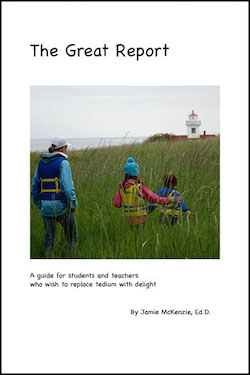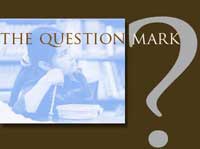 |
Going back to the 1930s, we saw leaders climb to power in a number of countries by playing to the fears of people who had suffered in various ways. Scapegoating was a favorite tactic along with false claims and stirring music. Feelings became more important than facts.
It should be noted that demagogues can rise on the Left and on the Right. They use similar tactics and show little respect for facts. They specialize in disinformation and lies. Propaganda is their medium and PhotoShopping Reality has been their tactic long before the software arrived.
|
But this is not just about politics. Mentalsoftness crops up whenever decisions might deserve some careful thought and research.
Prime Indicators of MentalSoftness™
|
1. Fondness for clichés and clichéd thinking - simple statements that are time worn, familiar and likely to carry surface appeal.
|
|
2. Reliance upon maxims - truisms, platitudes, banalities and hackneyed sayings - to handle demanding, complex situations requiring thought and careful consideration.
|
|
3. Appetite for bromides - the quick fix, the easy answer, the sugar coated pill, the great escape, the short cut, the template, the cheat sheet.
|
|
4. Preference for platitudes - near truths, slogans, jingles, catch phrases and buzzwords.
|
|
5. Vulnerability to propaganda, demagoguery and mass movements based on appeals to emotions, fears and prejudice.
|
|
6. Impatience with thorough and dispassionate analysis.
|
|
7. Eagerness to join some crowd or mob or other - wear, do and think what is fashionable, cool, hip, fab, or the opposite or whatever . . .
|
|
8. Hunger for vivid and dramatic packaging.
|
|
9. Fascination with the story, the play, the drama, the show, the episode and the epic rather than the idea, the question, the argument, the premise, the logic or the substance. We're not talking good stories or song lines here. We're talking pulp fiction.
|
|
10. Enchantment with cults, personalities, celebrities, chat, gossip, hype, speculation, buzz and blather.
|
Good schools and good teachers will combat mentalsoftness by equipping students with the 16 Habits of Mind identified by Costa and Kallick along with the questioning and thinking skills required to approach the truth. I have long argued that students must be equipped with a Questioning Toolkit to assist with this effort.
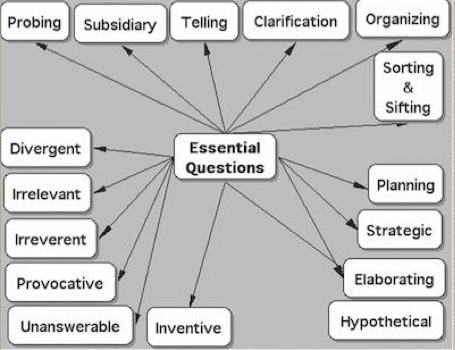
We might even hope to create a generation of what I call "Serial Questioners" who persist in the pursuit of truth much like a pit bull.
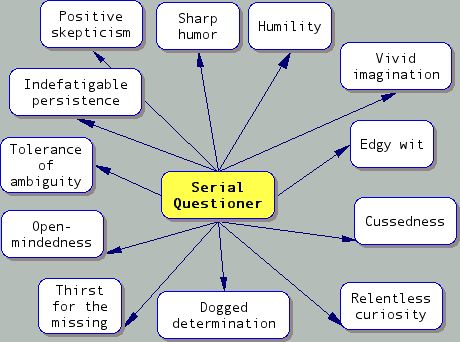
In these times of spin, deception and false claims, debunking has become a survival skill for everyone.
Things are often quite different from what they appear to be. When we accept claims and reports at face value there is a substantial risk that we will be hoodwinked. Variants on hoodwink include the following list from the thesaurus:
deceive, trick, dupe, outwit, fool, delude, inveigle, cheat, take in, hoax, mislead, lead on, defraud, double-cross, swindle, gull, scam; con, bamboozle,
hornswoggle, fleece, do, have, sting, gyp, shaft, rip off, lead up the garden path, pull a fast one on, put one over on, take for a ride, pull the wool over someoneís eyes, sucker, snooker.
This became clear just a few years ago when the housing market collapsed.
Reading the fine print
In the USA, just prior to the turn of this century, banks and mortgage consultants took advantage of mentalsoftness to sell millions of homes to people who really couldn't afford them and did not bother to read the fine print, leading to a financial collapse that is still being felt to this day.

© iStock
|
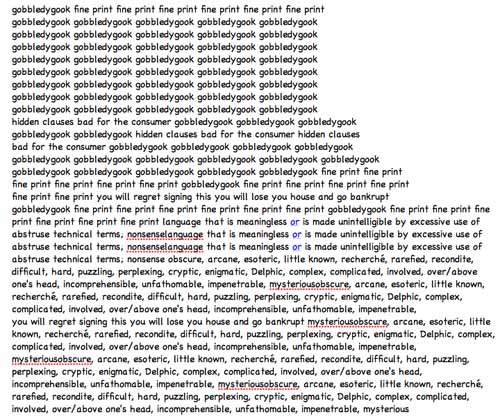

Unless we teach citizens to read, question and understand the fine print of their lives, they will remain susceptible to scams, schemes and flimflam artists. The Oxford American Writer's Thesaurus supplies the following words to convey the meaning of susceptible:
|
credulous, gullible, innocent, ingenuous, naive, easily led; defenseless, vulnerable; persuadable, tractable; sensitive, responsive, thin-skinned |
-
The collapse of the housing market and the mortgage industry in the USA illustrates the consequences of poor comprehension and questioning skills as millions of families signed bad agreements and as financial institutions foolishly lent money to poor credit risks. Many of the families did not comprehend what they were doing or signing; but it seems likely that those who made big profits from granting risky loans did understand. One group lacked comprehension. The other group lacked conscience. |
Which drugs will actually help me?
A decade earlier, the medical and pharmaceutical industry convinced many women to take HRT (Hormone Replacement Therapy) only to discover that cancer rates increased dangerously.
During the past year, a number of groups changed their definition of high blood pressure based on a single study that meant 30 million more Americans should take (and buy) medications.
It was amazing to watch so many health professionals embrace this new definition without challenging the report's findings and applicability to the general population.
As Harvard Medical School reported:
If you didn't have high blood pressure before, there's a good chance you do now.
Last year, new guidelines from the American Heart Association, the American College of Cardiology, and nine other health organizations lowered the numbers for the diagnosis of hypertension (high blood pressure) to 130/80 millimeters of mercury (mm Hg) and higher for all adults. The previous guidelines set the threshold at 140/90 mm Hg for people younger than age 65 and 150/80 mm Hg for those ages 65 and older.
This means 70% to 79% of men ages 55 and older are now classified as having hypertension. That includes many men whose blood pressure had previously been considered healthy. Why the change?
Do facts matter? Of course they do, but sometimes the facts are shrouded in technical language or sometimes they are obscured by memories weakened by time or alcohol.
This absence of facts dramatically influenced the proceedings of the Senate assessing Brett Kavanaugh's worth as a candidate for the Supreme Court. Sadly, the allegations of sexual assault went unproven thanks to a quick FBI investigation narrowly constrained in its scope by the President., leaving both sides wondering who was telling the truth in the absence of facts.
|

If anyone bothered to read the report and consider its sample and methodology, the decision to change the definition of high blood pressure seems rash and unwarranted, as several commentators pointed out.
Donít Let New Blood Pressure Guidelines Raise Yours
By H. Gilbert Welch
As Harvard Med reported, "The new guidelines stem from the 2017 results of the Systolic Blood Pressure Intervention Trial (SPRINT), which studied more than 9,000 adults ages 50 and older who had systolic blood pressure (the top number in a reading) of 130 mm Hg or higher and at least one risk factor for cardiovascular disease."
The sample population was not representative of the general population because they all had additional factors for cardiovascular disease, so there was no basis to apply the findings to the general population, but that did not hold any of these groups back. Just imagine the impact of this "leap of faith" upon the millions whose doctors would start prescribing meds to huge numbers of people previously left undrugged!
As H. Gilbert Welch points out, if you read the fine print, which almost nobody does, it turns out that the meds being pushed by this study and its sponsoring pharmaceutical company did not result in HUGE life-saving effects even for this special population of high risk patients:
Relative changes ó like a 25 percent reduction ó always sound impressive. Relative changes, however, need to be put in perspective; the underlying numbers are important. Consider the patients in Sprintís high target group (less than 140): About 8 percent had one of these cardiovascular events over four years. The corresponding number in the low target group (less than 120) was around 6 percent. Eight percent versus 6 percent. Thatís your 25 percent reduction.
|
Implications for schools
While it may sometimes seem a daunting challenge, schools must teach students the skills to seek facts when assessing the validity of claims and arguments. But it is more than a matter of teaching skills. As Nazi Germany demonsstrated, a well educated population is not automatically immune from the distortions and propaganda employed by demogogues. The skills must be grounded in the mental attitudes and habits of mind outlined in this article. We are aiming for informed skepticism.
|

